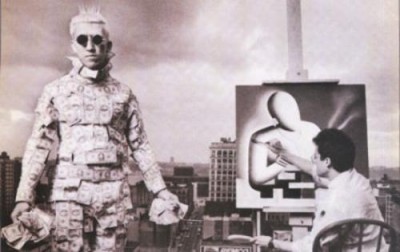| Reviews & Columns |
|
Reviews DVD TV on DVD Blu-ray 4K UHD International DVDs In Theaters Reviews by Studio Video Games Features Collector Series DVDs Easter Egg Database Interviews DVD Talk Radio Feature Articles Columns Anime Talk DVD Savant Horror DVDs The M.O.D. Squad Art House HD Talk Silent DVD
|
DVD Talk Forum |
|
|
| Resources |
|
DVD Price Search Customer Service #'s RCE Info Links |
|
Columns
|
|
|
Con Artist

Well, people certainly have their opinions on Mark Kostabi, and several of them get a chance to share them in Michael Sladek's documentary portrait Con Artist. When asked about his reputation in the art world, one replies, "In the art world, I've never heard anything good about him." Another likens Kostabi's work to Applebee's, and then corrects himself: "Applebee's aspiring to be Olive Garden."
The purists have plenty of reasons to loathe him, even if only on a professional level. Early in the film, when introducing some of his pieces, he says, "I made these paintings... with some help." That's a bit of an understatement. What he does (shown in a beautifully constructed reveal) is take Warhol's "Factory" concept and pushes it to the absolute limit: he employs idea people, who come up with the painting concepts, and then hand them off to his artist employees, who paint them. When they're done, Kostabi signs it. That's it, that's all he does. Many of his employees have never seen him paint. The thing is, it's no secret--it's what he's known for. "Modern art is a con," he said during his heyday, "and I am the world's greatest con artist."
What's kind of a shame is that he was not without talent; in the biographical section of the film, Sladek shows some of his early drawings and paintings, and they're really quite good. They provide fine background for the doc's vivid descriptions of the early 80s East Village art scene, which is compared in its nature and attitude to punk rock, graffiti art, and the earliest hip-hop. I'm a sucker for this kind of stuff; it's a fascinating period, and the film's old news footage and newspaper clippings are nicely interwoven with modern reflections by both Kostabi and his contemporaries.
It was during this period that he developed his "marketing personality"--basically, the idea that the power of celebrity was such that if he became a name, even if it was a name as an egotistical blowhard, that would drive up the price of his pieces. He made ridiculous, hyperbolic statements and presented himself as the bad boy of the scene. Exactly how much of this is a put-upon persona and how much of it was his real personality is up for debate ("I don't think that's an act," says one critic. "That's below his act")--and there is, of course, always the possibility that as he became more and more notorious, the persona became his real personality.
And then there's the not-doing-his-own-painting stuff. Some (including some in the film) have tried to explain it away as some kind of great prank, or to say that his career itself was a piece of meta-art, commenting on how all people are buying a famous artist's work for is the signature, or something like that. This might have some credibility if Kostsabi seemed to hold any of those views himself, even in retrospect. The best we can tell, he was just looking to make as much money as possible and get as famous as possible. The art itself was incidental. It was about selling.
Kostabi remains a savvy salesman; we see him trying to manipulate his image in the film, advising Sladek that a shot is "good B-roll," telling an employee, "I want to argue with you for Sladek's documentary," reportedly coaching other interview subjects. Sladek seems to get the last laugh by including these and other cringe-inducing moments (like his painful public access TV appearances), but he also inexplicably leaves out one of Kostabi's most notorious scandals. In a 1989 Vanity Fair interview, he said "These museum curators, that are for the most part homosexual, have controlled the art world in the eighties. Now they're all dying of AIDS, and although I think it's sad, I know it's for the better. Because homosexual men are not actively participating in the perpetuation of human life." This happened right before his fall from grace and subsequent bankruptcy in the early 1990s, but Sladek's film doesn't mention the uproar, blaming his rough patch in the 90s on the bursting of the Tokyo art bubble.
That's about my only major complaint with Con Artist, however. It's well-cut and well-paced, and if Kostabi remains somewhat impenetrable, I'm not sure if that's the fault of the film--it may not even be possible to know this guy. At one point, he seems to get genuinely emotional about his current lot in life, and asks plaintively, "Do you think it's insane? To desire to be loved?" In any other person's interview, we might read this as a penetrating, insightful moment. With this guy, who knows?
Sladek effectively closes the film with a series of opinions about art from his expert witnesses; the first are the most anti-Kostabi, the voices for artistic purity, and frankly, it's a little startling to hear their thoughts after immersing ourselves in the consumerism of the previous hour. Then, with each new interview subject, we hear a slightly different perspective, until we're hearing from those fully in favor of his method and his work. It's an interesting, compact way to literally include the full range of opinions. To this viewer, in that moment the case is made for the purer view--and even if the real world of art isn't that way, they should try to be. And even if they won't try, they should at least pretend.
Jason lives in New York. He holds an MA in Cultural Reporting and Criticism from NYU.
|
| Popular Reviews |
| Sponsored Links |
|
|
| Sponsored Links |
|
|
| Release List | Reviews | Shop | Newsletter | Forum | DVD Giveaways | Blu-Ray | Advertise |
|
Copyright 2024 DVDTalk.com All Rights Reserved. Legal Info, Privacy Policy, Terms of Use,
Manage Preferences,
Your Privacy Choices | |||||||











